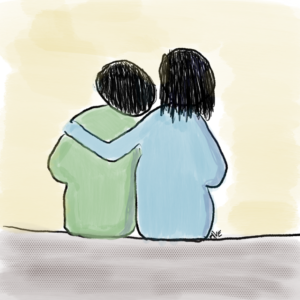
So many people have shared their pain with me this week. A newborn grandchild is in intensive care with an uncertain future. Another is facing the aftermath of a hurricane, and their town is devastated. People are still waiting for help. Another ended a long-time relationship. Another has a severe health scare. While another experienced an unexpected death in their family. Someone’s spouse is losing cognitive capacity, and finances are tight. Others have lost their long-held positions as their company downsizes. Some are worried about political polarization and the election aftermath. I could go on, as I know you can.
How do you respond to such pain of others? I am compassionate and often feel moved to action. I donate to some causes, but it feels like it is not enough. Of course, I listen to people and let them know they are in my thoughts and prayers. And they certainly are. I feel a heavy heart for the suffering.
Actually, listening without judgment is a powerful act of empathy, allowing us to connect deeply and provide solace to those experiencing grief, sadness, anger, and other emotions. Being with them is essential. We are interconnected, and it is easy to feel alone during challenging times. Showing our care and concern is valuable. While it can be hard to know what to say, simply being with someone who is in pain, giving empathy, and letting them know we care matters. In addition, I find that sending an email or a text message telling a person they are in my thoughts supports me and them.
It is also important not to get burned out. I used to believe I could not be at ease when others were suffering, and this belief cost me. I stayed in a stress and worry state for too long.
I don’t have everything figured out. Knowing that I am doing my best to listen and be there for others has helped me. In addition, I know that I am doing my part to make life better for others. If we each did something, it could really make a difference for us and others. Research actually shows that those who volunteer or are of service to others experience more positivity.
I am working on recognizing what is mine to do. I focus on asking others how I can be of support rather than taking over, which is a pattern I learned in my youth. I recognize that often, just being there is enough. Of course, where feasible, I offer suggestions and offer other resources for help. I share my own experiences when asked.
Of course, we need to protect our own wellbeing or we cannot benefit others. You can’t pour from an empty cup. Be sure to attend to your own emotional needs and take care of yourself amid the rhythm and pain of life.
I am writing a book with a colleague, Gila Seritcioglu, and teach courses on joy. We recognize that suffering and challenges are a part of life. We need to acknowledge our feelings and give ourselves and others empathy. We have coined the term JOYBeing to mean the joy of being. It is an invitation to connect with the joy of being alive, even during challenging times and to be on the lookout for moments of connection, joy and meaning. I try to notice the beauty around me such as the green trees turning yellow and orange and the blue sky and the sunny day–even amid all the pain and sorrow. I appreciate hearing a moment of triumph from a coaching client.
Managing others’ pain requires balancing empathy with self-care. How do you navigate this delicate balance? Please take care of yourself as you listen with compassion and support for others.
Kindly, share your experiences and insights on how you manage the pain of others in the comments below.
